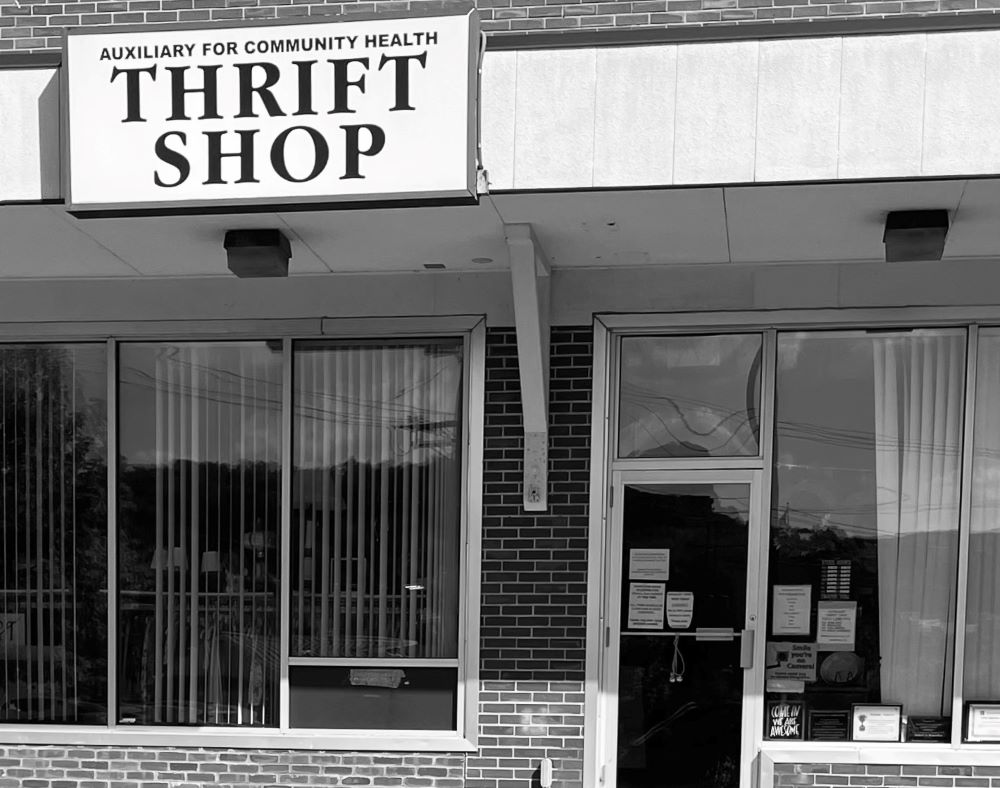Winsted Thrift Store Benefits Many

The thrift shop run by Winsted’s Auxiliary for Community Health benefits buyers with a selection of goods and helps local non-profits through grants. It can be found in the Levine Plaza at 120 Willow Street in Winsted.
By Jude Mead
Thrift shops have transformed in recent years. No longer just a haven for bargain hunters, these stores now attract a diverse array of shoppers from all walks of life. The appeal of thrift shops lies in their affordability, their potential as a source for unique treasures and the environmental benefit of recycling goods. The proceeds often go to local charitable causes.
The Auxiliary for Community Health Thrift Shop in Winsted checks all these boxes and has provided generous support to organizations in Norfolk for more than 20 years. The shop is run by a committee of the Auxiliary for Community Health, a group originally established in 1901 to provide non-medical supplies to the Litchfield County Hospital of Winchester, the county’s first hospital.
According to John Serafini, president of the Auxiliary for Community Health, and Susan Belle-Isle, chair of the Auxiliary’s thrift shop, the store first opened in 1965, inside the old maternity cottage on the hospital grounds. Donations of gently used goods were sold to help support the hospital.
“In 1974,” recalled Serafini, “[the shop] moved to a house purchased by the hospital on Main Street [in] Winsted. When the hospital declared bankruptcy, the house was sold, and the shop was offered space by the Winsted Health Foundation, which purchased the old hospital.” Sometime in the early 2000s the thrift shop moved once again, to its current site at 120 Willow Street, in Winsted’s Levine Plaza.
For those on a tight budget, thrift shops provide access to quality items, from clothing to household goods, at a fraction of the original cost. “The primary focus of the shop has always been to provide new and gently used items for reasonable prices,” said Belle-Isle. “I believe we are slightly down on good men’s clothing and shoes, as well as kitchen and household items. Women’s clothing and shoes are usually plentiful.”
The Auxiliary for Community Health Thrift Shop is not a consignment shop. Items are donated and sold to support the Auxiliary, which contributes to the purchase of medical-related equipment for local organizations. According to Serafini, “This has included equipment for the Charlotte Hungerford Hospital emergency room; AEDs [automated external defibrillators] to various non-profit entities like fire departments, schools, police, etc.; scholarships to students in the medical fields, including nursing, EMTs, veterinary and pharmacy; and various equipment to fire and police departments. I am sure I am missing something, but that is some of what has been done over the years.”
Norfolk is a recipient, along with non-profits in Barkhamsted, Colebrook, Hartland, Winchester, Winsted and New Hartford, of the Auxiliary’s support. Applications for help with medical-related needs—education, health or safety—are available at the thrift shop. These are reviewed by a committee and presented for approval by the Auxiliary board.
“Norfolk has been receiving awards from the Auxiliary since 2001 through the ambulance and fire departments, totaling over $86,000,” said Serafini.
Donations are always needed and welcomed. The Auxiliary for Community Health Thrift Shop accepts just about everything except large furniture pieces and electronics, said Belle-Isle (and “things that are in bad shape, broken or smell bad.”) The shop is open six days a week: Monday to Friday, 10 a.m. to 4 p.m., and Saturday from 9:30 a.m. to noon. Donations are accepted anytime they are open. More information on donations or how to volunteer at the shop can be obtained by calling 860-379-1997.
Serafini and Belle-Isle agree that the hard work is worth the effort. “We believe our shop provides a needed service to the communities it serves. Our volunteers are pleasant and helpful to customers, as well as being dedicated to the continued success of the shop. It is not just one person who makes our shop what it is. It is everyone involved in the shop and the Auxiliary itself.”
